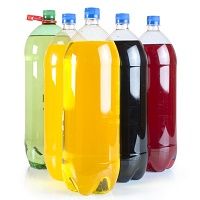Frequent Consumption of Sugary Drinks Increases Insulin Resistance and Raises Risk of Prediabetes
A new analysis of data from the Framingham Offspring Study indicated that the consumption of sugary beverages – but not diet beverages – is strongly associated with the progression of insulin resistance and the development of prediabetes.

A new analysis of data from the Framingham Offspring Study indicated that the consumption of sugary beverages — but not diet beverages – is strongly associated with the progression of insulin resistance and the development of prediabetes.
These conclusions support the findings of several previous studies but contradict those of several others, which have found that consumption of both sugary and artificially sweetened drinks increases the risk of incident diabetes.
The authors of the new study, which was published in the Journal of Nutrition, analyzed the association between cumulative mean consumption of sugary beverages or diet soda and new diagnoses of prediabetes in 1,685 cohort members followed over a median of 14 years. Mean participant age was 51.9 years ± standard deviation of 9.2 years. Some 59.6% of cohort members were women, and their mean body mass index (BMI) was 26.3 kg/m² ± standard deviation of 4.4 kg/m².
The cumulative mean consumption of sugary drinks and diet soda was estimated from food-frequency questionnaires. Multivariable Cox proportional hazard models were used to estimate the hazard ratios (HRs) of incident prediabetes, while linear regression models were used to estimate changes for each patient in homeostasis model assessment of insulin resistance (HOMA-IR).
After adjustment for multiple potential confounders, including baseline BMI, analysis showed that sugary beverage intake was positively associated with prediabetes (p of trend < 0.001). Cohort members who consumed the greatest number of sugary beverages — at least 3, 12-ounce servings per week but a median of 6 per week — were nearly 50% more likely to develop prediabetes than abstainers (HR, 1.46; 95% confidence interval [CI], 1.16-1.83).
Consumption of diet sodas was not significantly associated with new diagnoses of prediabetes. Moreover, neither the consumption of sugary beverages nor the consumption of diet soda was associated with significant increases in HOMA-IR.
“Although our study cannot establish causality, our results suggest that high sugar-sweetened beverage intake increases the chances of developing early warning signs for type II diabetes,” said the study’s senior author Nicola McKeown, PhD, a scientist at the USDA Human Nutrition Research Center on Aging at Tufts University. “Our findings support recommendations to limit sugar-sweetened beverage intake, which can be achieved by replacing sugary beverages with healthier alternatives such as water or unsweetened coffee or tea.”
There is, of course, nothing controversial in suggesting that people drink water — or even unsweetened coffee or tea – rather than sugary beverages. A multitude of studies have found significant associations between the amount of sugar that people drink and their risk, not only of incident prediabetes but also of type II diabetes itself. indeed, a 2010 meta-analysis that appeared in Diabetes Care combined data from 11 studies with 310,819 participants to conclude that people who drink 1 to 2 sugary beverages per day have a 26% greater chance of developing type II diabetes than abstainers.
The connection — or lack of connection – between the consumption of diet soda and incident diabetes is more controversial. Several studies have found an association, even though diet sodas do not increase blood sugar levels. For example, a study published in 2009 by Diabetes Care found that daily consumption of diet soda was associated with a 67% greater risk of incident diabetes then abstention among 6,814 participants in the Multi-Ethnic Study of Atherosclerosis.
Related Coverage:
Diabetics Need Not Avoid Butter
Diabetes: Getting a Jolt from the Cold
Obesity Plus Diabetes Equals Diabesity and Some States Have it Bad